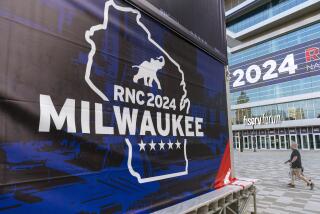‘Obamacare’ ruling gives GOP an ‘It’s. A. Tax.’ opening
The Day Two spin has begun on the Supreme Court’s decision to uphold the Patient Protection and Affordable Care Act, and much of the chatter has been about taxes. In particular, it’s been about Chief Justice John G. Roberts Jr.’s finding that the individual mandate was a tax, not a penalty, and how that could hurt President Obama in November.
It’s hard to argue that Obama would have been helped by a ruling that declared his signal legislative achievement to be unconstitutional. The decision was, without a doubt, a triumph for the president -- a potential legacy preserver. But the political ramifications are complex, and my hunch is that on balance it helps the GOP by energizing a group -- tea partyites -- that hasn’t been wild about the putative Republican nominee, Mitt “Romneycare” Romney.
And although I won’t speculate on Roberts’ motives (and in fact would resist arguments that electoral politics influenced his reasoning; go here and here for some fascinating forensics about Roberts’ thought process), the opinion he wrote sustaining the individual mandate could not be more politically damaging to Obama.
VIDEO: Supreme Court upholds healthcare law
For starters, by declaring that the mandate was a constitutional exercise of the federal government’s power to tax, he invited accusations that Obama had lied to the public.
Commenting on The Times’ editorial praising the decision, reader Alexander expressed a common sentiment when he wrote: “As I see it, this is a MAJOR victory for the GOP. Obama stated over and over again that the Affordable Care Act was NOT a tax... ‘you will not pay one dime, not one dime in additional taxes...’ Moreover, had he proposed a tax even many of the Dems in the Senate would not have voted for it.”
In fact, Obama repeatedly argued that the new law wasn’t a tax. Yet the Justice Department’s advocate before the Supreme Court, Solicitor General Donald B. Verrilli Jr., argued that not only was the individual mandate a valid exercise of Congress’ power under the commerce clause, it was a constitutional exercise of Congress’ tax power. As Verrilli put it in his initial brief: “The practical operation of the minimum coverage provision [i.e., the individual mandate] is as a tax law. It is fully integrated into the tax system, will raise substantial revenue, and triggers only tax consequences for non-compliance.”
DOCUMENT: Supreme Court ruling on healthcare law
The administration may insist that the mandate really isn’t a tax, regardless of Verrilli’s argumentation, but doing so requires the sort of sophistry that doesn’t fit into 30-second campaign ads.
Then there’s the opening Roberts presented for Republicans to accuse Obama of raising taxes on the middle class, contrary to his campaign promise. As a reader who goes by the humble moniker “I am the Tea PartyLeader” noted in response to The Times’ editorial: “Now that the Supreme Court has confirmed that Obama and the[D]emocrats have passed the largest tax increase in American history[,] Obama, if re-elected, will try to make it so that families making less than the poverty level will be exempt from paying the healthcare tax and those families making more than $250K will have to pay more healthcare tax to support those exempt.”
Just for the record, although there are lots of tax increases in the Affordable Care Act (e.g. taxes on tanning beds, medical devices and “Cadillac” healthcare plans), the “tax” represented by the individual mandate is hardly the largest in American history. It’s not even close. The Congressional Budget Office estimates that over 10 years, individuals will pay $45 billion in mandate-related penalties. Employers will pay $96 billion. In the federal scheme of things, that’s not a lot of money.
Nevertheless, the penalty will fall on anyone who doesn’t obtain insurance, regardless of income. That’s not an issue for the poor, who’ll have Medicaid or generous subsidies for private insurance. But it is for the working- and middle-class families Obama has championed.
Finally, the ruling has fed into the “tea party” hysteria about unlimited federal power, albeit in the context of taxes instead of regulation. As one commenter on the conservative HotAir blog put it, “Ya got a Tax and spend Government on Crystal Meth…. and Roberts gives them unlimited Taxing Power.”
That’s a richly ironic takeaway from Roberts’ opinion. The chief justice noted that Congress has a long history of using its tax power to promote purchases of favored products, such as homes and college degrees. But unlike the nebulous boundaries that the Supreme Court has set on Congress’ power to regulate interstate commerce, the justices have policed the limits of Congress’ taxing power aggressively, Roberts wrote, citing cases that invalidated taxes “obviously designed to regulate behavior otherwise regarded at the time as beyond federal authority.”
He also observed that tax law can’t force people to do things they don’t want to do; it can only compel the payment of a tax. “Imposition of a tax ... leaves an individual with a lawful choice to do or not do a certain act, so long as he is willing to pay a tax levied on that choice,” Roberts wrote.
But it’s unrealistic to expect people to read Supreme Court decisions. Memes develop from headlines, which in this case declared that the individual mandate in “Obamacare” will remain in effect because it’s a tax. Or, as the GOP will frame it from now until November: It’s. A. Tax. And by couching his endorsement of the Affordable Care Act in those terms, the chief justice has given Republicans a way to make the mandate even more unpopular.
ALSO:
The healthcare law fight isn’t over
Rand Paul to Supreme Court: Drop dead
Healthcare cluelessness from the Supreme Court’s conservatives
More to Read
A cure for the common opinion
Get thought-provoking perspectives with our weekly newsletter.
You may occasionally receive promotional content from the Los Angeles Times.











